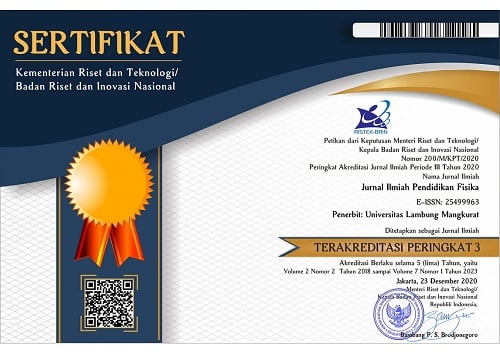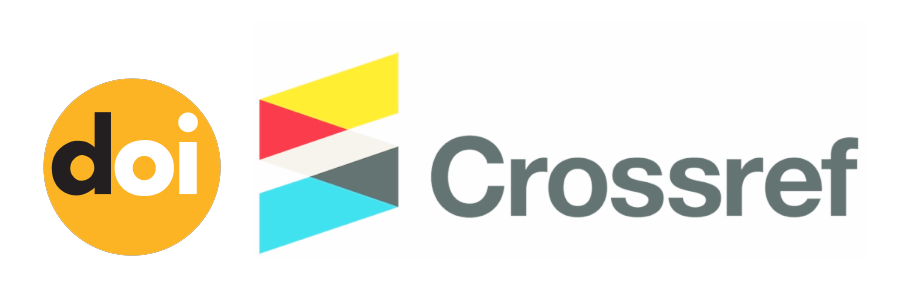The Effect of Project-Based Blended Learning Model on Students’ Creative Thinking Skills in Global Warming Topic
Abstract
This paper investigates the effect of project-based blended learning (PBBL) on students' creative thinking skills, particularly in the context of global warming. The research employed a quasi-experimental design using a nonequivalent control group. The study involved 60 students from the 11th grade at SMAN 16 Bandar Lampung. The experiment group with 30 students studied global warming through the PBBL strategy, while the control group used full face-to-face project-based learning (PjBL). The instrument consists of six essay questions. Validity and reliability tests were conducted on the hypothesis test results, indicating significance at a level of less than 5 percent. Using the t-test, a significant difference was observed in the average creative thinking skills between the experiment and control groups. Moreover, the effect size score was 0.785 (high category), confirming the high impact of learning through PBBL. The average n-gain for creative thinking abilities was 0.793 (high) for the experimental class and 0.3791 (moderate) for the control class. It can be inferred that the PBBL model has a positive impact on enhancing students' creative thinking abilities. The research implies that PBBL has the potential to revolutionize traditional teaching methods, fostering students' creative thinking skills, especially when applied to complex global issues like climate change.
Keywords
Full Text:
PDFReferences
Amtiningsih, S., Dwiastuti, S., & Sari, D. P. (2016). Peningkatan kemampuan berpikir kreatif melalui penerapan guided inquiry dipadu brainstorming pada materi pencemaran air. In Proceeding Biology Education Conference: Biology, Science, Enviromental, and Learning, 13(1), 868-872.
Ayu, I., Sastrika, K., Sadia, I. W., dan Muderawan, I. W. (2013). Pengaruh model pembelajaran berbasis proyek terhadap pemahaman konsep kimia dan keterampilan berpikir kritis. E-Journal Program Pascasarjana Universitas
Dai, N. Van, Trung, V. Q., Tiem, C. Van, Hao, K. P., & Anh, D. T. V. (2021). Project-based teaching in organic chemistry through blended learning model to develop self-study capacity of high school students in Vietnam. Education Sciences, 11(7).
Desnylasari, E., Mulyani, S., & Mulyani, B. (2016). Pengaruh model pembelajaran project based learning dan problem based learning pada materi termokimia terhadap prestasi belajar siswa kelas XI SMA Negeri 1 Karanganyar tahun pelajaran 2015/2016. Jurnal Pendidikan Kimia, 5(1), 134-142.
Dombrowski, E., Rotenberg, L., & Bick, M. (2013). Theory of knowledge. Oxford: Oxford University Press.
Dziuban, C., Graham, C. R., Moskal, P. D., Norberg, A., & Sicilia, N. (2018). Blended learning: the new normal and emerging technologies. International journal of educational technology in Higher education, 15, 1-16.
Eksangsri, E., Tippabust, T., & Thanon, J. (2014). Feasibility Study on Reuse of Washed Water in Electronic Industry: Case Study for Flexible Printed Circuit Board Manufacturing in Thailand. Procedia Environmental Sciences 20: 206–14.
Farrow, J., Schneider Kavanagh, S., & Samudra, P. (2022). Exploring relationships between professional development and teachers’ enactments of project-based learning. Education Sciences, 12(4), 282.
Gencer, A. A., & Gonen, M. (2015). Examination of the effects of reggio emilia based projects on preschool children’s creative thinking skills. Procedia - Social and Behavioral Sciences. 186, 456–460.
Graham, C. R. (2006). Sistem pembelajaran campuran: Definisi, tren saat ini, dan arah masa depan. Dalam CJ Bonk & CR Graham (Eds.), The handbook of blended learning: Perspektif global, desain lokal (hlm. 3–21). San Fransisco: Pfeiffer.
Gül, A., Topay, M., & Özaydÿn, O (2009). Terhadap ancaman pemanasan global, pentingnya hutan kota. Makalah yang dipresentasikan pada Kongres Internasional Davraz, Isparta, Türkiye.
Filsaime, D. K. (2018). Menguak rahasia berfikir kritis dan kreatif. Jakarta: Prestasi Pustakarya.
Harmuningsih, D., & Saleky, S. R. J. (2019). Pengetahuan, persepsi dan sikap generasi muda tentang perubahan iklim dan pengaruhnya terhadap niat perilaku pro-lingkungan. SPECTA Journal of Technology, 1(3), 27–36.
Henriksen, D., Mishra, P., & Fisser, P. (2016). Infusing creativity and technology in 21st century education: A systemic view for change. Journal of Educational Technology & Society, 19(3), 27-37.
Hugerat, M. (2016). How teaching science using project-based learning strategies affects the classroom learning environment. Learning Environments Research, 19(3), 383-395.
Husamah, H. (2014). Pembelajaran bauran (blended learning). Jakarta: Prestasi Pustaka Jaya.
Irwanto, N., & Suryana, Y. (2016). Kompetensi Pedagogik untuk Peningkatan dan Penilaian kinerja guru dalam rangka implementasi kurikulum nasional. Sidoarjo: Genta Group Production.
Jules, T. D., & Sundberg, K. C. (2018). The internationalization of creativity as a learning competence. Global Education Review, 5(1).
Jumaat, N. F., Tasir, Z., Halim, N. D. A., & Ashari, Z. M. (2017). Project-based learning from constructivism point of view. Advanced Science Letters, 23(8), 7904-7906.
Khalid, M., Saad, S., Abdul, H. S. R., Ridhuan, A. M., Ibrahim, H., & Shahrill, M. (2020). Enhancing creativity and problem solving skills through creative problem solving in teaching mathematics. Creativity Studies, 13(2), 270–291.
Khanifah, K., & Saefan, J. (2016). Pengaruh model project based learning melalui metode praktikum terhadap kecakapan kreativitas pada materi getaran harmonis siswa kelas xi mia sma negeri 1 comal. Jurnal Penelitian Pembelajaran Fisika, 7(1), 49–55.
Khoiri, N., Marinia, A., & Kurniawan, W. (2016). Keefektifan model pembelajaran PjBL (Project Based Learning) terhadap kemampuan kreativitas dan hasil belajar siswa kelas xi. Jurnal Penelitian Pembelajaran Fisika, 7, 142–146.
Kurup, P. M., Cox, P., & Deed, C. (2015). Building primary pre-service teachers’ confidence and competence to teach science: The effect of planning, teaching and reflecting on an integrated science unit. Journal of Academic Perspectives, 8(2), 1-16.
Lu, K., Yang, H. H., Shi, Y., & Wang, X. (2021). Examining the key influencing factors on college students’ higher-order thinking skills in the smart classroom environment. International Journal of Educational Technology in Higher Education, 18, 1-13.
Larasati, F., & Geografi, J. (2020). Tingkat literasi sains global warming terhadap sustainable lefestyles guru sekolah dasar di desa bangsri kabupaten jepara. Edu Geo, 8(2), 113–120.
Linda, R. F. C., Widodo, S., Karimah, N., & Ngazizah, N. (2019). Penerapan project based learning pada praktikum mahasiswa pgsd semester 2 untuk meningkatkan kreativitas dan pemecahan masalah. Kolokium Penelitian Universitas, 214–222.
Limbong, R. (2021). Isu pemanasan global pada pergeseran paradigma studi keamanan dalam hubungan internasional. Jurnal Diplomasi Pertahanan, 7(1).
Mustafa, P. S. & Roesdiyanto, R. (2021). Penerapan teori belajar konstruktivisme melalui model PAKEM dalam permainan bolavoli pada sekolah menengah pertama. Jendela Olahraga, 6(1), 50–65.
National Research Council. (2013). Monitoring progress toward successful K-12 STEM education: A nation advancing?. National Academies Press.
Noviyana, H. (2017). Pengaruh model project-based learning terhadap kecakapan kreativitas matematika siswa. Jurnal Edumath, 3(2), 110-117.
OECD (2016), Innovating education and educating for innovation: the power of digital technologies and skills. OECD Publishing, Paris
Putri, L. T., Nuroso, H., & Khoiri, N. (2015). Efektivitas model pembelajaran berbasis proyek (project based learning) terhadap keaktifan dan kecakapan kreativitas siswa kelas x sma n 2 semarang. Jurnal Penelitian Pembelajaran Fisika, 6(2), 38–43.
Puspitarini, D. (2022). Blended learning sebagai model pembelajaran abad 21. Ideguru: Jurnal Karya Ilmiah Guru, 7(1), 1–6.
Ramadhan, S., Sukma, E., & Indriyani, V. (2019). Environmental education and disaster mitigation through language learning. IOP Conference Series: Earth and Environmental Science, 314(1).
Ratnasari, R., Susatyo, E. B., & Nurhayati, S. (2017). Pengaruh pembelajaran berbasis proyek berbantuan lembar kerja siswa terhadap kemampuan berpikir kreatif. Chemistry in Education, 6(2), 1-7.
Rede, A. (2010). Pembelajaran tematik pemanasan global dan kesadaran diri siswa sekolah dasar. Jurnal Ilmu Pendidikan Universitas Negeri Malang, 17(3), 105155.
Rodiyana. (2013). Penerapan strategi pembelajaran inkuiri terhadap kemampuan berpikir kritis dan kretaif siswa. Jurnal Pembelajaran Fisika, 1(2): 20-25.
Shah, S., & Kumar, R. (2019). Effective constructivist teaching learning in the classroom. Shah, RK (2019). Effective Constructivist Teaching Learning in the Classroom. Shanlax International Journal of Education, 7(4), 1-13.
Songkram, N. (2015). E-learning system in virtual learning environment to develop creative thinking for learners in higher education. Procedia - Social and Behavioral Sciences. 174 (1), 674-679.
Tong, Y., & Wei, X. (2020). Teaching design and practice of a project-based blended learning model. International Journal of Mobile and Blended Learning (IJMBL), 12(1), 33-50.
Ulger, K. (2018). The effect of problem-based learning on the creative thinking and critical thinking disposition of students in visual arts education. Interdisciplinary Journal of Problem-Based Learning, 12(1).
Wahyuni, A., & Kurniawan, P. (2018). Hubungan kemampuan berpikir kreatif terhadap hasil belajar mahasiswa. Matematika: Jurnal Teori dan Terapan Matematika, 17(2), 1-8.
Westerlaken, M., Christiaans-Dingelhoff, I., Filius, R. M., De Vries, B., De Bruijne, M., & Van Dam, M. (2019). Blended learning for postgraduates; an interactive experience. BMC medical education, 19(1), 1-7.
Yanti, W. A. (2015). Persepsi siswa smp kelas 7 terhadap konsep pemanasan global. Prosiding Seminar Nasional Fisika (E-Journal) SNF 2015, IV, 1–4.
DOI: https://doi.org/10.20527/jipf.v7i3.9380
Refbacks
- There are currently no refbacks.
Indexed by: Jurnal Ilmiah Pendidikan Fisika is licensed under a creative commons attribution-share alike 4.0 international license
Statistics Counter |
















